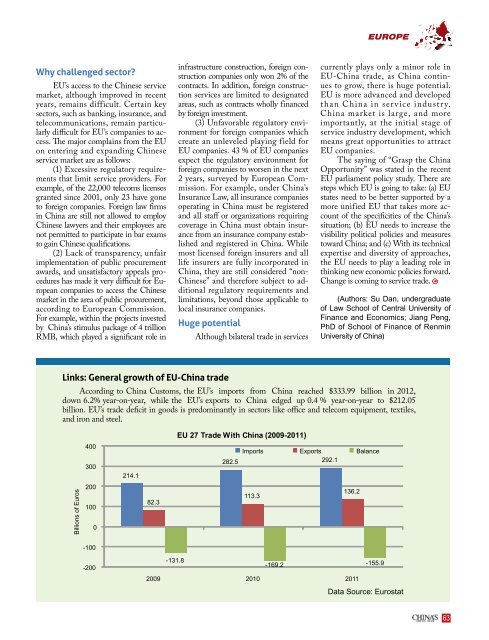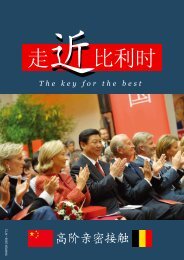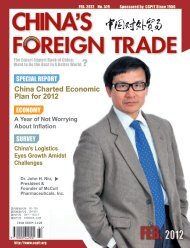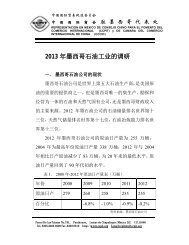Create successful ePaper yourself
Turn your PDF publications into a flip-book with our unique Google optimized e-Paper software.
EUROPE<br />
Why challenged sector?<br />
EU’s access to the Chinese service<br />
market, although improved in recent<br />
years, remains difficult. Certain key<br />
sectors, such as banking, insurance, and<br />
telecommunications, remain particularly<br />
difficult for EU’s companies to access.<br />
The major complains from the EU<br />
on entering and expanding Chinese<br />
service market are as follows:<br />
(1) Excessive regulatory requirements<br />
that limit service providers. For<br />
example, of the 22,000 telecoms licenses<br />
granted since 2001, only 23 have gone<br />
to foreign companies. Foreign law firms<br />
in China are still not allowed to employ<br />
Chinese lawyers and their employees are<br />
not permitted to participate in bar exams<br />
to gain Chinese qualifications.<br />
(2) Lack of transparency, unfair<br />
implementation of public procurement<br />
awards, and unsatisfactory appeals procedures<br />
has made it very difficult for European<br />
companies to access the Chinese<br />
market in the area of public procurement,<br />
according to European Commission.<br />
For example, within the projects invested<br />
by China’s stimulus package of 4 trillion<br />
RMB, which played a significant role in<br />
infrastructure construction, foreign construction<br />
companies only won 2% of the<br />
contracts. In addition, foreign construction<br />
services are limited to designated<br />
areas, such as contracts wholly financed<br />
by foreign investment.<br />
(3) Unfavorable regulatory environment<br />
for foreign companies which<br />
create an unleveled playing field for<br />
EU companies. 43 % of EU companies<br />
expect the regulatory environment for<br />
foreign companies to worsen in the next<br />
2 years, surveyed by European Commission.<br />
For example, under China’s<br />
Insurance Law, all insurance companies<br />
operating in China must be registered<br />
and all staff or organizations requiring<br />
coverage in China must obtain insurance<br />
from an insurance company established<br />
and registered in China. While<br />
most licensed foreign insurers and all<br />
life insurers are fully incorporated in<br />
China, they are still considered “non-<br />
Chinese” and therefore subject to additional<br />
regulatory requirements and<br />
limitations, beyond those applicable to<br />
local insurance companies.<br />
Huge potential<br />
Although bilateral trade in services<br />
currently plays only a minor role in<br />
EU-China trade, as China continues<br />
to grow, there is huge potential.<br />
EU is more advanced and developed<br />
than China in service industry.<br />
China market is large, and more<br />
importantly, at the initial stage of<br />
service industry development, which<br />
means great opportunities to attract<br />
EU companies.<br />
The saying of “Grasp the China<br />
Opportunity” was stated in the recent<br />
EU parliament policy study. There are<br />
steps which EU is going to take: (a) EU<br />
states need to be better supported by a<br />
more unified EU that takes more account<br />
of the specificities of the China’s<br />
situation; (b) EU needs to increase the<br />
visibility political policies and measures<br />
toward China; and (c) With its technical<br />
expertise and diversity of approaches,<br />
the EU needs to play a leading role in<br />
thinking new economic policies forward.<br />
Change is coming to service trade.<br />
(Authors: Su Dan, undergraduate<br />
of Law School of Central University of<br />
Finance and Economics; Jiang Peng,<br />
PhD of School of Finance of Renmin<br />
University of China)<br />
Links: General growth of EU-China trade<br />
According to China Customs, the EU’s imports from China reached $333.99 billion in 2012,<br />
down 6.2% year-on-year, while the EU’s exports to China edged up 0.4 % year-on-year to $212.05<br />
billion. EU’s trade deficit in goods is predominantly in sectors like office and telecom equipment, textiles,<br />
and iron and steel.<br />
Data Source: Eurostat<br />
63

















